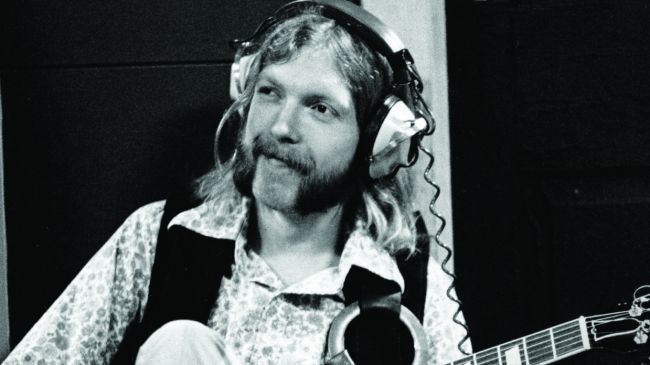Southern Man
Duane Allman is justly lauded for
his work with his Brothers, but there’s
more to the legacy of the doomed
guitarist than At Fillmore East.

Duane Allman: letting it slide
At Fillmore East might be his most
cherished legacy, but it was the seven
notes Duane Allman contributed to the
opening salvo of Eric Clapton’s Layla
that made the young guitarist a rock
icon. As it turned out, Duane played on
much of 1970’s Derek & The Dominos album
Layla And Other Assorted Love Songs, but
it’s his timeless guitar riff and slide
playing on the title track that’s most
memorable.
During a December 1970 interview with
Jon Tiven of the New Haven Rock Press,
Duane explained how he got involved with
the album in the first place: “Well, I
went down there to watch them make that
record because I was interested in it, I
thought ‘Well now, the cat’s got him a
band’, because I’ve been an admirer of
Eric Clapton for a long, long time; I’ve
always dug his playing, he inspired me a
lot and I always just personally dug his
playing. Figured I’d get a chance to
meet him and watch this thing go down,
y’know? So I went down. So when I saw
him he acted like he knew me, like I was
an old friend, ‘Hey man, how are you?’.
And he said, ‘As long as you’re here we
want you to get on this record and make
it with us, we need more guitar players
anyway.’ So I did, I was real flattered
and glad to be able to do it.”
Duane might not have realised it, but
Eric was likely even more thrilled to
have him involved. Legend has it that
Clapton heard Allman’s guitar solo on
soul man Wilson Pickett’s cover of The
Beatles’ Hey Jude on his car radio: “I
drove home and called Atlantic Records
immediately,” Clapton said. “I had to
know who that was playing guitar and I
had to know now.” It remains Clapton’s
favourite guitar solo…
Pickett’s track was born at Rick Hall’s
legendary Fame studios in Muscle Shoals,
Alabama. Duane was only 22 years old
when he found himself working at the
studio as a session musician. Fame
produced sides for Atlantic Records, and
Duane was on call when the label’s queen,
Aretha Franklin, visited the small town.
His slide playing on Franklin’s stunning
cover of The Band track The Weight is
sublime. Yet the track that caught
Clapton’s attention almost didn’t
happen.
“Pickett came into the studio,”
remembered Rick Hall in Randy Poe’s book
Skydog: The Duane Allman Story. “And I
said, ‘We don’t have anything to cut.’
We didn’t have a song. Duane was there,
and he came up with an idea. By this
time he’d kind of broken the ice and
become my guy. So Duane said, ‘Why don’t
we cut Hey Jude?’ I said, ‘That’s the
most preposterous thing I ever heard.
It’s insanity. We’re gonna cover The
Beatles? That’s crazy!’ And Pickett said,
‘No, we’re not gonna do it.’ I said,
‘Their single’s gonna be No.1. I mean,
this is the biggest group in the world!’
And Duane said, ‘That’s exactly why we
should do it – because [the Beatles
single] will be No.1 and they’re so big.
The fact that we would cut the song with
a black artist will get so much
attention, it’ll be an automatic smash.’
That made all the sense in the world to
me. So I said, ‘Well, okay. Let’s do it.’
Pickett still wasn’t convinced. It took
some unsubtle persuasion from Duane to
seal the deal: “What’s wrong? You don’t
got the balls to sing it?” That was the
last straw for Pickett. He begrudgingly
cut the song, an automatic smash as
Duane had predicted.
As a musician, Duane Allman was a
spiritual cat who, while infamously
fuelled by alcohol and drugs, was always
in touch with the power of music: “Miles
Davis (early Miles) and John Coltrane
and Robert Johnson, Junior Wells, Muddy
Waters; see, you get a goal in mind, a
note that you want to hit with your band
and then you gotta go out on the road
and your spiritual battery runs down.
You get home and you listen to that
stuff and say ‘Ah, there it is, I have
it before me, I know what to do’, and
you go out and do it.
His slide guitar work, always performed
with a glass Coricidin pill bottle, and
often in open E tuning, was the result
of countless hours of hard work. His
brief life – he didn’t even make the 27
club – was crammed full of iconic music
performances, and shortly before his
death he summed up his own legacy.
“Develop your talent, man, and leave the
world something,” said Allman. “Records
are really gifts from people. To think
that an artist would love you enough to
share his music with anyone is a
beautiful thing.”
 |
ED MITCHELL: |